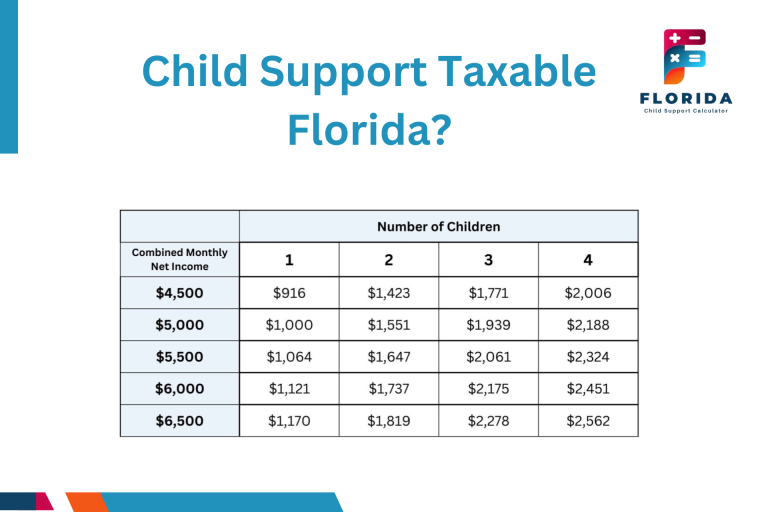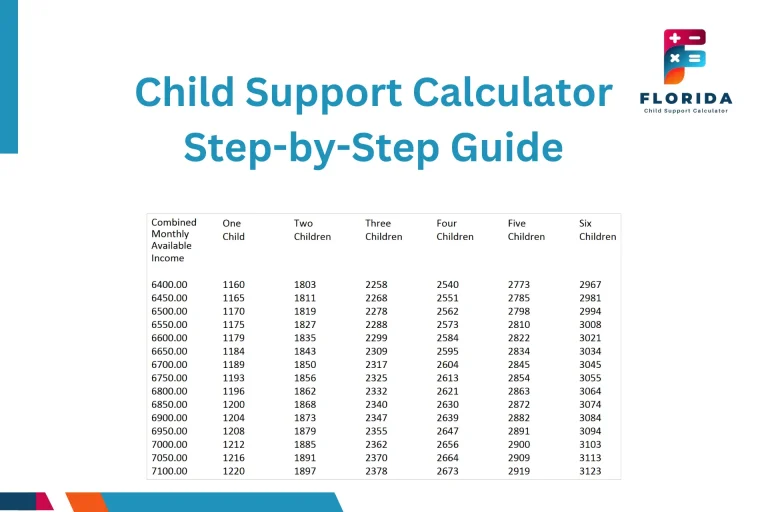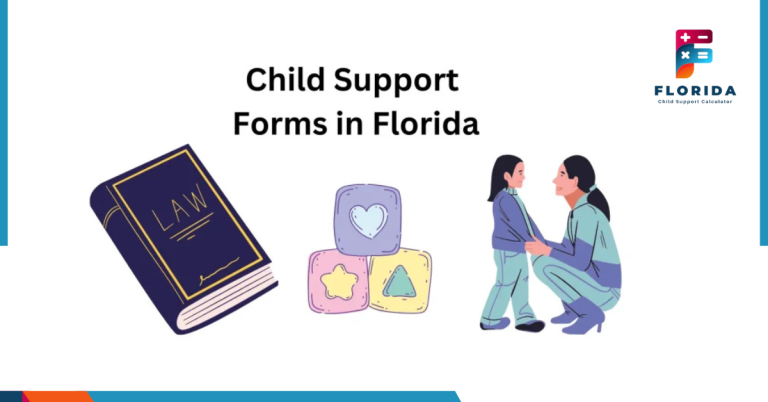Can a Calculator Predict the Judge’s Final Child Support Order?
Can a calculator predict the judge’s final child support order? Great question, and trust me, you’re not the only one wondering. You punch in some numbers, and boom, a number pops out. Sounds simple, right? But here’s the kicker: judges aren’t robots. They don’t always follow what the calculator says. Things like custody arrangements, hidden income, or even a child’s special needs can change everything.

While tools like the Florida Child Support Calculator are helpful, they’re just the starting line, not the finish line. Stick around, because knowing how judges decide can save you from big surprises.
How Child Support Calculators Work

A child support calculator feels like magic, right? Pop in the numbers, and it gives you how much should be paid. But wait, it’s not that simple. These calculators are tools, not court orders. They work using rules like income, parenting time, and expenses, but don’t capture everything real life throws at you. Even the Florida child support calculator offers just an estimate, not a promise. Courts look deeper before making final decisions.
What Do These Calculators Consider?
Let’s break it down. When you use one of these calculators, it’s like filling in a form at school, simple but not the full story. Judges check lots of details beyond what’s in those boxes.
| Factor | What It Means |
|---|---|
| Income | Salaries, bonuses, side jobs |
| Custody/Time Sharing | How much time each parent spends with the child |
| Healthcare Costs | Medical, dental, and insurance expenses |
| Childcare/Daycare Costs | If needed, for parents to work |
| Special Needs or Extra Costs | Disabilities, tutoring, travel, etc. |
Even the best tool, like Florida’s child support worksheet, can’t fully handle situations like balancing custody and finances during a divorce.
Are Online Calculators Accurate?
Here’s the truth: calculators are helpful, but they don’t decide your future. For example, if you input $4,000 income with equal custody, it might say $600 per month. Sounds right… until you remember your kid has braces or your ex lives 200 miles away. Then the judge steps in.
Even judges consider more than calculators when setting child support. And sometimes, calculators miss things like estimating child support mistakes due to hidden income or shared expenses.
Can a Calculator Predict the Judge’s Final Child Support Order in Florida?
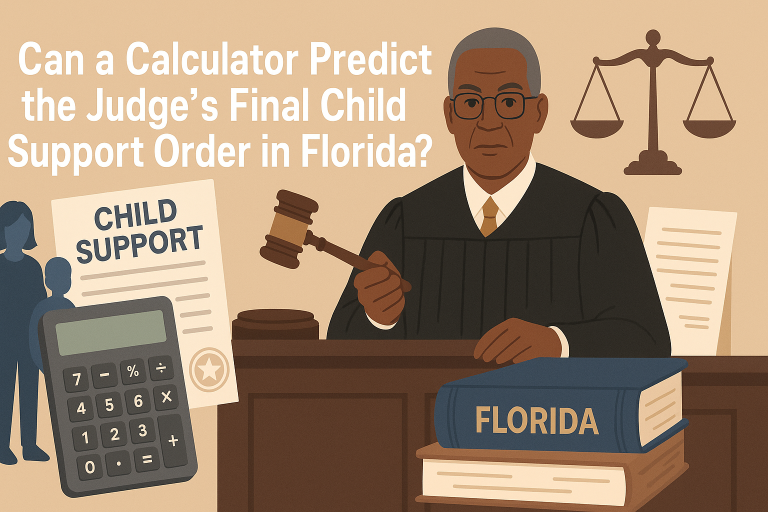
This is the big question everyone asks. And honestly? No, it can’t. A calculator gives a starting point, but judges use real-life facts that no online tool can guess. Whether you’re using the Florida child support calculator vs DIY math, both are the final order depends on the court.
Why the Calculator Is Just a Starting Point
Think of the calculator like a recipe. It tells you the basics, but the judge is the chef; they add ingredients based on what your family needs. That’s why the number the calculator gives might change once you step into court.
Sometimes, hiring a child support lawyer in Florida helps because they know how judges think. Plus, Florida custody laws heavily affect how payments are set.
Common Reasons Judges Override Calculator Results
Judges aren’t robots. They change calculator numbers when things don’t fit the formula. Here’s when it happens:
- The child has high medical costs
- One parent travels far for visits
- Special schooling or therapies are needed
- Hidden income or an unstable job
- Parenting time isn’t equal, like the calculator assumes
Even when parents think they’ve figured it out, the judge can increase or reduce child support based on fairness, not just math.
What Judges Consider That Calculators Don’t

If calculators were perfect, courtrooms wouldn’t need judges. But judges look at the real world, not just numbers. This is why calculators often fall short, especially when families have unique needs.
Income Volatility and Hidden Income
Not everyone has a steady paycheck. Some people drive for Uber, work as freelancers, or receive payment in cash. The calculator assumes a stable job, but the judge digs deeper to find real income.
If you suspect the other parent isn’t being honest, the court uses tools beyond the child support calculator accuracy check. Judges spot tricks like claiming child support back in Florida when income was hidden.
Parenting Plans, Custody, and Time-Sharing
The calculator doesn’t know if one parent keeps canceling visits or isn’t involved enough. Judges adjust based on real parenting time, not just what’s written on paper.
In Florida, custody arrangements hugely affect child support. If one parent moves far away, or the child mostly stays with one parent, expect the amount to change, no matter what the calculator said.
Child’s Best Interests and Lifestyle
Judges ask: “What does the child truly need?” Is it braces? Therapy? Extra tutoring? A calculator doesn’t know that. But the court does.
The child’s lifestyle before the divorce also matters. If the child was used to piano lessons or private school, judges may increase support to keep life stable, even if the child support forms in Florida don’t ask about it.
Impact of Remarriage, New Children, and Financial Hardships
Life changes fast. A parent might remarry or have more kids. The calculator doesn’t care, but the judge does. They strike a balance between the old family and the new one.
If your job is lost or you have a disability, the court can adjust support, something the child support guidelines also mention, but calculators rarely catch.
Temporary vs. Permanent Child Support Orders

When it comes to child support, not all orders are forever. Some are temporary, made while the case is still open. Others are final, set after the court reviews everything. The Florida child support guidelines help, but calculators don’t always show the full picture. Judges can change amounts between temporary and final orders based on real-life updates.
Do Calculators Work for Temporary Orders?
Yes… But only partly. When the case is just starting, calculators give a rough estimate for temporary support. But remember, this number isn’t set in stone. Judges often adjust it if one parent suddenly loses a job, moves out of state, or has new costs like daycare.
For example, parents who move out of state often face adjustments. Also, if someone hides income, the court may fix the number differently than the calculator suggests.
How Judges Adjust Between Temporary and Final Orders
Here’s the deal. What starts as a quick math check often changes later. Maybe one parent brings proof of higher costs, or the child’s medical needs pop up. Judges take all this in before setting the final order.
Even estimating child support mistakes during early hearings leads to big changes later. And if a parent applies for modifying child support due to job loss or more kids, the final number will be different than the temporary one.
| Type of Order | What It Means | Is Calculator Enough? |
|---|---|---|
| Temporary | In the short term, while the court decides | (With limits) |
| Final | Long-term, set after full court review | Judge adjusts) |
Myths About Child Support Calculators (Busted)

People believe calculators are magic truth machines. Nope. They are tools, helpful, but not perfect. Many parents learn the hard way that the court doesn’t always stick to what the calculator says.
Myth 1: The Calculator Number Is Final
This one’s common and wrong. The calculator gives a starting guess. But if your kid has special schooling needs, or one parent’s job isn’t stable, the judge will change it.
Even the Florida child support worksheet shows how estimates don’t always match reality, especially when hidden income shows up later.
Myth 2: Judges Can’t Change Calculator Results
Spoiler: judges are not robots. They don’t take orders from calculators. If one parent travels 200 miles for visits or covers full healthcare, the judge adjusts the number.
That’s why parents often file for modifications in child support when life changes. Plus, balancing custody and finances also shifts how much is paid.
Myth 3: Calculators Cover Everything
Nope. Calculators don’t ask about piano lessons, therapy, or how often one parent skips visits. They also don’t care if a parent remarries or has more kids later.
Judges do. That’s why they often check the child support forms in Florida for extra info before making the final call. And when both parents agree to something fair, even if it’s different from the calculator, the judge might accept it.
Real Parent Experiences: Calculator vs. Judge
You don’t have to look far to find parents who’ve seen calculators fail in court. The difference between what a calculator says and what a judge orders can be big, sometimes really big.
Example 1: Travel Changes Everything
“Our calculator showed $500, but the judge raised it to $750 because my ex moved out of state. Travel costs added up fast.” (Source: Real Florida parent)
This is common when one parent moves, as explained in if one parent moves out of state, which judges always consider.
Example 2: Hidden Income = Higher Support
“The calculator said $400, but when the judge found my ex had a side business, it jumped to $800.” Happens all the time when someone doesn’t report full income. That’s why understanding how income is calculated matters.
Example 3: Judge Accepted Our Agreement
“We agreed on $600. The calculator showed $680, but the judge approved our deal because it worked for both of us.” Courts often accept fair agreements, even when child support forms show slightly different amounts.
How to Prepare for Your Child Support Hearing

Getting ready for a child support hearing can feel scary, but it doesn’t have to be. Judges don’t just rely on calculators; they need real proof. The more details you bring, the better chance the judge makes a fair decision based on facts, not guesses from a calculator like the Florida child support calculator.
Gather Financial Documents Judges Look For
Start by collecting the right papers. Forgetting one thing could change your entire case. Judges often need proof to check if the income is calculated correctly.
Pay stubs or income records
Tax returns for the last year
Bank statements
Proof of childcare and healthcare costs
Any documents related to special needs or extra expenses
Custody agreements, like those explained in balancing custody and finances
Bringing these to court shows you’re prepared and serious.
Address Potential Deviations Early
If you know the calculator isn’t right for your situation, say so early. For example, maybe one parent travels long distances, or the child needs therapy, things that calculators miss.
You can even bring proof if one parent has hidden income. Judges expect this and will listen. Also, if your parenting plan recently changed, like someone moved, as covered in if one parent moves out of state, share that too.
Working With a Child Support Lawyer in Florida
Sometimes, doing it alone is risky. Lawyers understand what judges look for beyond what the child support worksheet shows. They help explain special circumstances like medical needs, job loss, or income changes.
Plus, hiring a child support lawyer in Florida can make a huge difference if things get messy, like when one parent hides money or disagrees with the parenting schedule.
Calculator vs. Judge: The Final Verdict
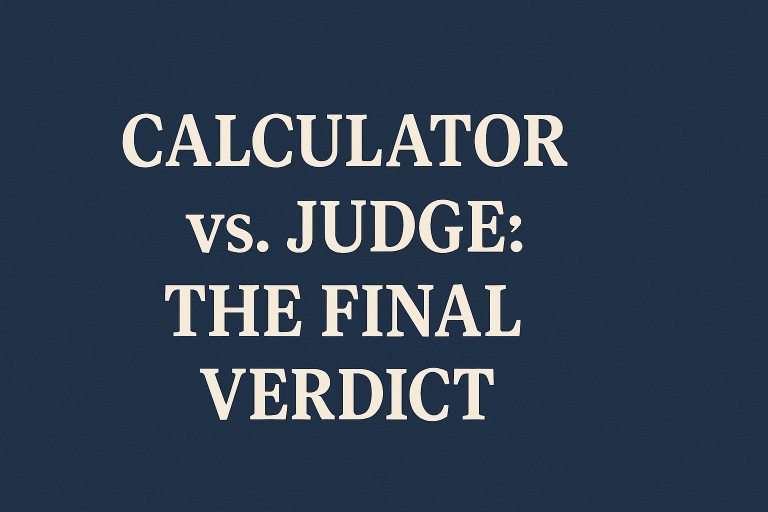
So, does the calculator win? Not really. A calculator is like a flashlight; it helps you see, but it doesn’t show the full road. Judges hold the real power, and they look beyond numbers.
Can You Trust Online Child Support Calculators?
Yes, but only for a quick idea. The calculator doesn’t know if you just lost a job or if your child has special needs. Judges adjust based on real facts, just like they do when handling child support modification cases.
Also, calculators don’t consider things like parent relocation or unpaid debts.
What Matters More: Numbers or Negotiation?
Surprise, negotiation matters just as much, maybe more! If both parents agree on a fair number, judges often approve it, even if it’s a little different than what the Florida child support calculator suggests.
This often happens when parents understand their situation better than any formula, or when they use child support forms in Florida to show an agreement.
Tips to Navigate Florida Child Support Court Successfully
Bring every document, income, expenses, and custody plans
Be honest about job changes, travel, or special needs
Talk with the other parent if possible; judges like fair agreements
Don’t hide income, our tutors can figure it out
Know that child support guidelines are guides, not final answers
FAQs About Child Support Calculators and Judge Decisions
Many parents get stuck on the same questions. Here are answers, short, simple, and real.
Is the Florida child support calculator accurate?
It’s helpful but not perfect. Judges can change the number based on real-life factors like custody or special costs.
Can a judge change the child support amount?
Absolutely. This happens often, especially if someone has hidden income or if parenting time isn’t equal.
What if both parents agree on a different amount?
Judges usually accept it if it’s fair, legal, and fits the child’s needs, like agreements written using the child support forms.
Does the calculator consider hidden income?
Nope. That’s where the judge steps in, especially when income calculation issues pop up.
How do travel costs or parenting plans affect child support?
If one parent moves, like covered in if one parent moves out of state, the judge often raises or lowers child support based on fairness.
Final Thoughts: Are Child Support Calculators Reliable or Just a Rough Guide?
Let’s be real, child support calculators are helpful tools. They give you a starting point. But they’re not magic, and they don’t decide your future. Judges do. Whether it’s about balancing custody and finances or dealing with hidden income, the court looks way beyond the numbers.
So, can a calculator predict the judge’s final child support order? Nope, not perfectly. It’s like checking the weather app. It helps you decide whether to carry an umbrella, but it can’t control the rain. Judges check things like parenting time, job changes, special needs, or if one parent lives far away, as explained in if one parent moves out of state.
Your best move? Be prepared. Use tools like the Florida child support worksheet to get an idea, but bring documents, be honest, and, if needed, get help from a child support lawyer in Florida.
In the end, calculators are a guide. Judges are the decision-makers. Understanding that could save you time, money, and stress.

